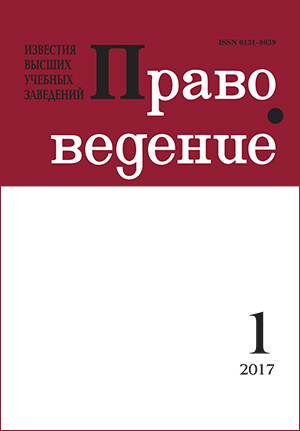Methodological meaning of recognition of the exercise of state functions as an object of crimes in public office
Abstract
The notion of an object of crimes in public office as state authority and civil service interests does not reflect the real scope of public relations which are prejudiced. Limiting the object by the interests of power and civil service does not cover an individual and social well-being and does not fully take into account the content of the state mechanism. Criminal legal interest constitutes not the protection of the power itself, but rather the protection of the state activity aimed at ensuring public order and justice and representing the exercise of the state functions by all authorized entities. Evolution of the state functions determines modification of its controlling action. This creates a methodological framework for modernization of the criminal law to counter crimes in public office taking into account the development of a modern state and its ongoing functions. The content of the norms stipulating the liability for the crimes in public office should be predetermined by changing actors, areas and methods of the state influence. Formed in the middle of the last century, a system of norms stipulating the liability for the crimes in public office does not correspond to the changed nature of functioning of the Russian state. The transition from a distribution economy to a market economy has led to the development of new relationships between governmental organizations and business entities. Along with the previously prevailing methods of persuasion and coercion, the method of contractual regulation has become widespread and is widely used in the exercise of the state functions. Its implementation is not ensured by the effective criminal and legal protection, as evidenced by the annual decrease in the number of persons convicted of corruption, against the background of the illegal budget spending and the damage caused by corruption crimes. New criminal and legal means of combating corruption relations and of bringing all beneficiaries of corruption to justice are necessary.
Keywords:
object of crimes in public office, exercise of functions of the state, state function of combating corruption, corruption relations, officer, abuse of power, excess of official powers
Downloads
References
Downloads
Published
How to Cite
Issue
Section
License
Articles of "Pravovedenie" are open access distributed under the terms of the License Agreement with Saint Petersburg State University, which permits to the authors unrestricted distribution and self-archiving free of charge.




